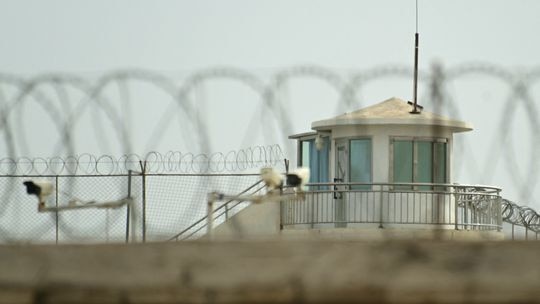China sentenced scholar of Uighur culture to life in jail: rights group
Rahile Dawut is a widely respected researcher of the minority group’s religious and cultural traditions who hasn’t been seen since 2017.

A leading scholar of Uighur traditional culture who disappeared in December 2017 has been sentenced to life in prison for endangering China’s state security, a human-rights group said, citing an unnamed Chinese official.
The scholar, Rahile Dawut, was renowned for crisscrossing the oasis towns and shrines of the Xinjiang region in far western China to document religious festivals, music performances and traditional storytelling of her own Uighur community.
When she disappeared, family and colleagues believed she had likely been detained as part of a sweeping campaign of forcible assimilation Chinese authorities carried out against Uighurs and other Turkic minority groups, which included the incarceration of hundreds of thousands in indoctrination camps and prisons.
Last year, the UN human-rights office said China had committed grave violations in Xinjiang, documenting credible accounts of torture and sexual abuse of people who had been arbitrarily detained in what the Chinese government has called an effort to curb extremism.
Rahile, 57, was a professor at Xinjiang University and founder of a folklore institute. She was known as a prolific and demanding scholar, and a generous mentor who would share knowledge and resources and welcome students and visiting scholars for meals at her mother’s house.
Details of Rahile’s fate have been difficult to obtain. The Dui Hua Foundation — a US-based human-rights group that tracks political prisoners in China and negotiates with the government for their release — said it had previously been told Rahile was tried in December 2018 and convicted of “splittism,” a crime of endangering state security. The group said Thursday that a person in the Chinese government confirmed that an appeal by Rahile had been rejected.
“Although there has been speculation that Professor Rahile Dawut was given a long sentence, this is believed to be the first time that a reliable source in the Chinese government has confirmed the sentence of life imprisonment,” Dui Hua said in a statement.
Rahile’s daughter, Akida Pulat, said in a phone interview from Seattle, where she lives, that she is devastated by the news.
“I am speechless,” she said. “The thought of not seeing her for the rest of my life is unimaginable.”
The Xinjiang government didn’t immediately respond to a request for comment.
Fellow scholars said Rahile’s case is emblematic of the Chinese government’s aggressive effort to dilute Uighur identity in Xinjiang, a region that for decades has been fractured by ethnic conflict between local Turkic Muslim groups and state-supported waves of Han Chinese migrants.
Former students said Rahile never commented on politics and was seen as having a good sense of where the red lines were in researching potentially sensitive topics of religion and identity. She is one of dozens of prominent Uighurs in academia, business and the arts who have been imprisoned or gone missing in recent years.
“The Chinese government says Rahile is guilty of ‘splittism’. The truth, though, is that her only crime was being born a Uighur,” Joshua Freeman, a historian at Academia Sinica in Taiwan, wrote on X, the social-media platform formerly known as Twitter. Citing the scholar’s contributions and good humour, he wrote: “Everyone should know her name.”
Her sentence is “absurd, blind cruelty,” wrote Rian Thum, a historian at the University of Manchester. “Difficult to write or talk about this monstrous act by the Chinese state.”
The official silence surrounding Rahile’s case is in line with broader efforts by the Chinese government to tamp down criticism of its campaign in the Xinjiang region. Beijing opposed the release of the UN report last year. Its mission to the UN had also called on member nations not to attend an event Tuesday on the sidelines of the UN General Assembly — hosted by the Atlantic Council’s Strategic Litigation Project, Human Rights Watch and Amnesty International — that focused on how to respond to the 2022 report and “examine options for pursuing justice for the Uighur people.”
In a letter, which was earlier reported by National Review, the Chinese mission accused the groups of “plotting to use human rights issues as a political tool to undermine Xinjiang’s stability and disrupt China’s peaceful development.”
Sophie Richardson, the China director at Human Rights Watch, displayed a copy of the letter at the event. “Any government that’s going to go out of its way to do this first of all has no business sitting on the U.N. Human Rights Council,” she told the audience. “But also, it’s essentially confirming that it’s got a lot to hide and it knows it.”
China’s mission to the UN didn’t immediately respond to a request for comment.
The Wall Street Journal



To join the conversation, please log in. Don't have an account? Register
Join the conversation, you are commenting as Logout